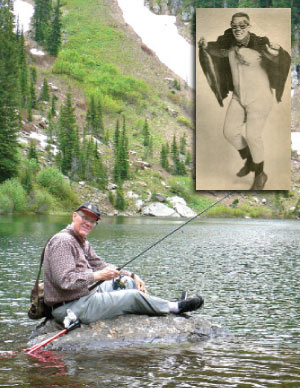

The Magazine of The University of Montana
The Seven Ps and Other Lessons
By John Heaney ’02
Photos courtesy of Bob McCue

An avid outdoorsman, Wicks enjoyed fishing Montana’s mountain lakes.
Above: Wicks’ alter ego, The Great Pumpkin, was a Halloween fixture at Shakey’s Pizza in downtown Missoula. The Missoulian featured The Great Pumpkin on the front page in the early 1970s.
It’s Chicago in the early 1980s. The economy has tanked and jobs are scarce, especially in the financial industry.
Brian Wesbury, fresh out of UM with an economics degree, is competing against people with master’s degrees and extensive resumes for the few jobs that are available. His immediate future looks a bit uncertain.
Unbeknownst to him, however, Wesbury possesses one distinct advantage: He happens to be a veteran of UM economics Professor John Wicks’ empirical research design seminar. The experience gained in that class, Wesbury has since been told, is one of the key reasons he landed his first job in the storied economic department at Harris Bank.
“That’s what started off my career,” says Wesbury, who is now considered one of the top economic forecasters in the United States.
Wesbury is just one of thousands of “seminar veterans,” which is what Wicks called students who successfully completed his legendary class.
“You wear that name like a badge of honor,” says Bob McCue, a seminar veteran from the late seventies.
Wicks started teaching the class shortly after he arrived at UM in 1964. It was open to UM students in most majors, but it took more than just signing up for the class to enroll. A new student needed a recommendation from a veteran, and he or she also had to sit for an interview with Wicks. The class, which typically had ten to twenty students, gathered once a week on couches and chairs in the living room of Wicks’ home on South Higgins Avenue, just across from Dornblaser Field. Each student also was required to meet with him once a week at his office on campus.
Every semester the class tackled a different project, exploring economic issues ranging from finding the variables that make it more likely for a person to steal music off the Internet to local food production to determining the value of Missoula’s quality of life. Students would research the topic, design a questionnaire, go door-to-door to conduct the survey, and finally analyze the data. The results would sometimes generate articles Wicks published in peer-reviewed journals.
While the course content was valuable in itself, the practical lessons Wicks taught beyond economics is where he was most impactful.
One of his famous lessons was that of the Seven Ps: Proper Prior Planning Prevents Piss-Poor Performance.
“I still use the Seven Ps today,” Wesbury says. In fact, he mentions them in his most recent book, which acknowledges the role Wicks played in his career.
Wicks also had a unique method for honing students’ public speaking skills.
“He would ‘ding’ parenthetical ‘you knows,’” says Andrew Pryor, a seminar veteran from the early 2000s. “Every time someone said ‘you know,’ he would say ‘ding.’ And he expected you to keep going and not break your concentration. It really helped students’ speech patterns, whether you liked it or not.”
Wicks also was known for his notorious Pitkin Premium homebrew, affectionately known among veterans as PP. The beverage was concocted in a plastic garbage can in Wicks’ kitchen.
“We were welcome to have a glass if we wanted,” McCue recalls. “Some did actually like it, and some said they did to kiss up to John.”
Pryor, who lovingly describes PP as an “almost nonalcoholic beer that had different flavors and consistencies each time it was brewed,” was lucky enough to be entrusted with the secret recipe.
It wasn’t a special type of hops or flavoring or brewing technique. Ever the economist, Wicks’ secret was using the most inexpensive ingredients available.
“I’m sure he had measurements for the yeast and sugar and other ingredients,” Pryor says. “But they had to be the absolute cheapest possible price you could find. That was the secret to the success of PP.”
The final seminar Wicks taught was spring 2011. He died February 25, 2012, at age seventy-five.
His legend, however, lives on.
“His students loved him,” UM economics Professor Doug Dalenberg says. “John was a bit of a character. He was old-school but generated lots of lasting relationships with students.”
Wesbury and a group of veterans started a fund in the economics department in Wicks’ honor. He hopes to perpetuate the seminar because “it really does provide undergrads with things that they don’t get at other schools.”
Many veterans gathered in April for a celebration they dubbed “The Final Seminar” at the Doubletree in Missoula.
“He still had about six cases of Pitkin Premium left,” McCue says. “So we passed out a little bit to everyone and toasted John one last time. And that was the end of the PP.”
And the end of an era, too.

 Email Article
Email Article 